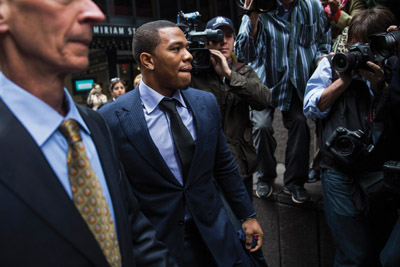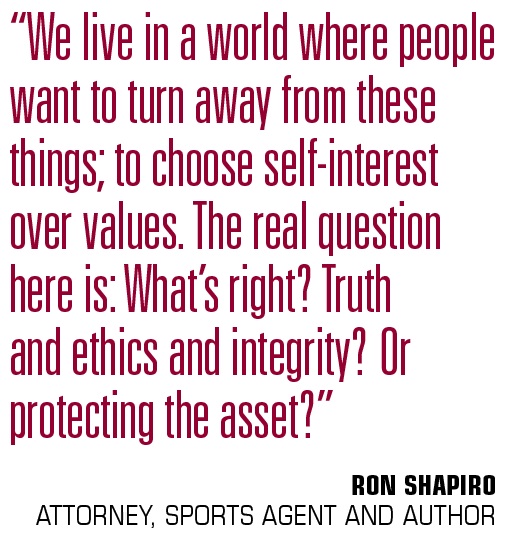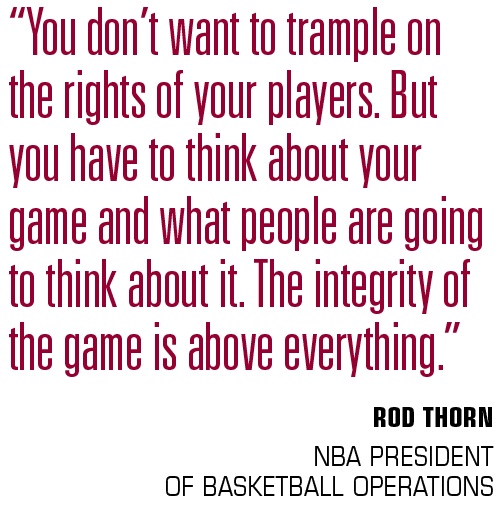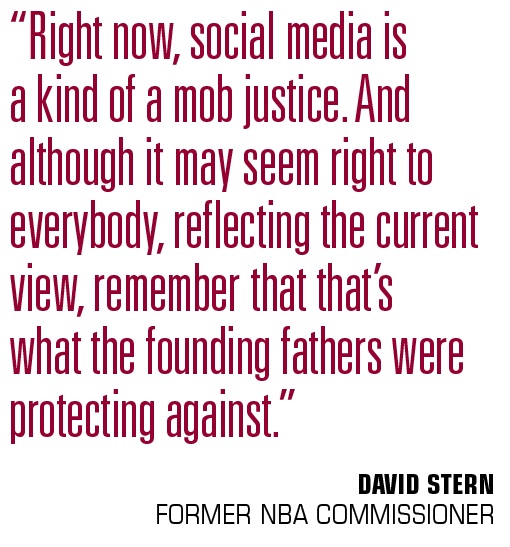The former NFL player who oversees discipline for the league watched from the front table at an owners meeting late last year as the league’s approach toward handling player conduct took a long-awaited turn.
One after another, owners went to the microphone to voice their feelings about the events of the most recent season, when a series of violent incidents — most notably two high-profile players charged with domestic violence and one accused of child abuse — sullied the league’s reputation.
“It was a very emotional moment,” said Troy Vincent, executive vice president of football operations for the league, who in December testified during a congressional hearing on domestic violence in sports. “For the first time, it wasn’t about resources. It wasn’t about filling stadiums. It wasn’t about revenue. It wasn’t about collective bargaining.
 |
Scrutiny of player discipline reached its peak with the case of Ray Rice.
Photo by: Getty Images |
“I heard men and women at the ownership level talk about doing what’s right.”
Do what’s right.
In the calm after the storm, it sounds simple enough. But what’s right for whom? Gauged how? And when?
One of the lessons to emerge from the NFL’s experience is that an already complex balancing act has turned from precarious to perilous, driven largely by the rapidity with which word travels and opinions are shaped.
Thanks to TMZ, anyone with an iPhone has access to all the bandwidth of the nightly news. Thanks to Twitter and Facebook, anyone with an opinion can speak as authoritatively as The Washington Post or The New York Times.
Balancing the interest of a team or school, the image of a sport, fairness to a player and the clamor of the public always has been tricky territory for those charged with the care of a property. But it has been complicated by the rapid manner in which news spreads and fans respond.
Athletes charged with family violence may be top of mind.
But this also is the day of Donald Sterling, the former Los Angeles Clippers owner banned by the NBA for making racist statements, and Bruce Levenson, the Atlanta Hawks owner who stepped away from ownership after it was revealed that he sent a racially insensitive email.
It is the day of performance-enhancing drugs in baseball, when a player once thought to be the game’s best served the longest suspension ever issued for steroid use, while an increasing number of his peers stand clogged outside the doors to the Hall of Fame.
It is the day of college athletes challenging universities that bring in billions to cut them in on their fair share. And athletic programs severing decades-long ties with conferences in the name of financial gain.
It is the day when one of the sweeter memories of summer, an entirely African-American team from Chicago named for Jackie Robinson winning the Little League national championship, would turn bitingly sour when the team was stripped of that title because it used players from outside its chartered borders.
Any of these incidents, taken by itself, would be cause for conversation. Stacked atop each other, in so compressed a span, they cry out for examination.
A Turnkey Intelligence survey of sports fans in March commissioned by SportsBusiness Journal (see results) found that consumers see the very items that dominated the headlines — athlete conduct and performance-enhancing drug use — as the two biggest threats to the sports industry, with both more than doubling the response to issues such as the fixing of games, fan conduct and insensitivity to gender or race.
Seventy percent of fans said they would prefer their favorite team take a pass on acquiring a player implicated in
violent crime, which was slightly more than said they would shy away from a player who fixed games or used performance-enhancing drugs. Twice as many fans gave a thumbs down to players tied to violent crime as wanted to stay away from those tied to nonviolent crime or marital infidelity.
Attorney Ron Shapiro entered the sports world 40 years ago as a baseball agent. Today, he spends less time with players and more time counseling organizations and leaders in and out of sports, focusing on negotiation and conflict resolution.
Among his clients: the University of Maryland, which left the ACC for the Big Ten; the Atlanta Hawks, the team owned by Levenson; and the Baltimore Ravens, who forever will be remembered as ground zero for the shift in the manner in which teams deal with player conduct.
“We live in a world where people want to turn away from these things; to choose self-interest over values,” said Shapiro, who stressed that his assessment is not restricted to sports. “The real question here is: What’s right? Truth and ethics and integrity? Or protecting the asset? Whether it be a corporate asset, a church asset or a team asset. Whatever kind of asset it may be.
“Historically, it was protect the asset. And now, there is some balancing taking place.”
Shifting the approach on player discipline
The NFL’s approach has been to admit its mistakes and point to a series of hires and procedural changes it has instituted in the last three months.
It brought in three female advisers to help shape its new policies and procedures on domestic violence. It hired a former sex crimes prosecutor to head up an internal investigations unit to look into accusations against players and employees, and the former director of the Bureau of Alcohol, Tobacco, Firearms and Explosives to implement the new personal conduct policy. It implemented far harsher minimum penalties for violent crimes, with room for even longer suspension when aggravating factors are present.
But the shift that may prove to have the greatest impact is the one formalizing the process by which the league deals with players accused of a crime, and particularly a violent crime.
Under the policy adopted by owners at the December meeting, a player or other team or league employee charged with a violent crime — including domestic abuse or sexual assault — may be placed on paid leave while the case makes its way through the criminal justice system.
For players, that would mean a stay on the exempt list, a little-used designation generally applied to players returning from long absences, allowing them to work with the team without taking up an active roster spot.
The shift is reflective of decisions made last season by the Minnesota Vikings and Carolina Panthers, who rather than leaving the matter in the hands of the league requested that their players — running back Adrian Peterson and defensive end Greg Hardy, respectively — be placed on the exempt list.
The on-field implications of placing a player on the exempt list can be significant. The Vikings and Panthers played without key players who took up large salary cap slots.
“These are unpopular decisions [with front offices],” Vincent said. “You’re taking salary cap hits. You can’t replace that player. In one case you’ve got $11 million and in another $13 million sitting at home while you’re trying to win football games. But it’s the right thing to do. If this is what we’re about, this is the way we have to move forward.”
For years, the default was for teams, leagues and often even universities to allow players to play while their cases moved through the system. There were occasional exceptions. But, for the most part, players have been allowed to play until convicted.
All of that changed when video circulated of Ray Rice knocking his then-fiancée unconscious during an altercation in an elevator.
“With the Ray Rice situation, America saw a video,” Vincent said. “There was a constant image of what this was. In Hardy’s case, they read excerpts [Hardy’s girlfriend said he threw her on a bed covered with loaded guns]. In Adrian’s case, when you saw a child, a defenseless 4-year-old child and those wounds, that left images in all of America’s mind.
“It gets back to what’s morally right.”
Again, this takes us to the question: Right for whom?
Both Rice and Peterson challenged the way that the league treated them, Rice in arbitration and Peterson in court. In
 |
Slava Voynov is suspended with pay as he awaits trial on domestic abuse charges.
Photo by: Getty Images |
both cases, the suspensions were overturned. The NFL was found to have suspended Rice twice for the same violation. A judge ruled that Peterson was penalized under the league’s new, tougher policies for violations that occurred while players were under the previous guidelines.
Vincent said that, in hindsight, the NFL made a mistake not only in treating violent crimes too leniently, but by not establishing clear penalties for specific crimes. As a result, the league appeared to be responding to the response, rather than addressing the violation itself.
While many will welcome the league’s tougher stance, some wonder about the fairness of suspending players while their case is adjudicated, even if they receive their pay.
“This is not like the policeman suspended for some alleged misuse of weapon,” said Kenneth Shropshire, a law professor and director of the Wharton Sports Business Initiative, whose recent book “Sport Matters” examines leadership issues in sports. “A police officer is not going to fall out of shape or miss a year of football life. So it is very different. I think that’s where the toughest call comes.
“The standard around industry is to take somebody off the job if there is a strong allegation and you want to complete the investigation. That’s where it gets unfortunate for the player because, in this case, sitting for a protracted period can be a penalty in and of itself.”
This is the direction in which things are headed.
‘Much more scrutiny today’
The NBA faced one domestic assault case this season, suspending Charlotte Hornets reserve forward Jeffrey Taylor without pay for 24 games after he pleaded guilty to the charge in November. The Hornets banned Taylor from team activities beginning with the revelation of his arrest in September, but he continued to collect his paycheck.
While it was the team, and not the league, that took the initial action — which was one that Taylor did not oppose — the result was the same: A player was taken out of uniform while his case was resolved, rather than remaining in public view game after game under the guise of due process.
“There’s been a major change,” said Rod Thorn, who oversaw player discipline for the NBA as head of basketball operations from 1984 to 2000 and returned to a similar role as the league’s president of basketball operations in 2013. “When you look at what transpired during those days and what transpires today, there is so much more scrutiny today.
“You don’t want to trample on the rights of your players. But you have to think about your game and what people are going to think about it. The integrity of the game is above everything.”
Consider the dramatic difference between the way the leagues have handled recent domestic violence cases compared with the way the NBA dealt with Kobe Bryant when he was charged with sexual assault in July of 2003.
It took more than a year, covering the entirety of a season, for Bryant’s case to be resolved. Presumed to be headed to trial for rape, Bryant played through the season, started the All-Star Game and starred in the playoffs, traveling back and forth to Colorado for hearings.
When asked whether it might be best for the NBA if Bryant were relieved of his playing duties, then-Commissioner David Stern responded in a manner that attracted criticism from many who presumed Bryant guilty.
“We don’t have a Patriot Act in the NBA,” Stern said at the time. “That means you’re innocent until proven guilty.
If every time someone was accused and there were allegations, they were required to stop their life, that wouldn’t be a good thing. That could be their choice [to sit out while on trial], but they shouldn’t be forced to.”
In a recent conversation, Stern did not want to revisit his handling of Bryant, other than to point back to his statements of the time, and to the fact that the case eventually was dismissed. But he did speak generally about the league’s collectively bargained position that a player be allowed to exhaust the legal process before facing consequences for off-court transgressions.
“We were comfortable saying there’s a police action, there’s a prosecutorial function and there’s a judicial function, and when they’re all played out we will take appropriate actions,” Stern said. “We didn’t have an independent investigative branch. In today’s climate, I think that the leagues are going to change in that regard. And it should make them uncomfortable. But it’s reality.”
Considering stances he took while commissioner, it is difficult to envision Stern responding differently if he were faced with the same decision today. But he concedes that the pressure would be far greater than those dealt with a decade ago.
“Right now, social media is a kind of a mob justice,” Stern said. “And although it may seem right to everybody, reflecting the current view, remember that that’s what the founding fathers were protecting against.”
Like the NFL and NBA, the NHL handled its most recent case of domestic abuse by suspending the player indefinitely, with pay, while his case makes its way through the judicial system.
Los Angeles Kings defenseman Slava Voynov was arrested in October after taking his wife to the emergency room with injuries to her cheek, elbow and neck. Earlier in the night, police had received a report of a woman screaming in Voynov’s neighborhood.
Voynov was charged with felony domestic abuse in November and is awaiting trial, though attorneys representing his wife now say she does not want her husband prosecuted. A trial is expected later this month.
Along with the image hit they took from having a player accused of beating his wife, the Kings initially took a cap hit, being forced to count Voynov’s $4.1 million salary even though he was unable to play.
The NHL granted the team relief in November, when Voynov was charged and it became clear that the matter would take more time to resolve.
“When Voynov was charged, the decision we made was: On our own, we believe this is serious enough to take him away from the game,” NHL Commissioner Gary Bettman said. “I’m not buying in to the fact that things have dramatically changed [in how leagues handle players charged with crimes]. I think consciousness and the importance of certain levels of conduct may be focused on more than ever before. But I’ve never felt the need to sit back and wait for the judicial system to run its course in the appropriate case.”
The appropriate case.
Decided how? In the best interest of whom? And when?
At the start of the conversation, Bettman pointed out that the answers would be neither black nor white.
“Something different is happening here, and I’m not sure yet that we know what it means or where we go next,” Shropshire said. “Overall, we have to look to balance how we evaluate everybody.
“It’s the most difficult balance: Moving rapidly and moving fairly at the same time.”








